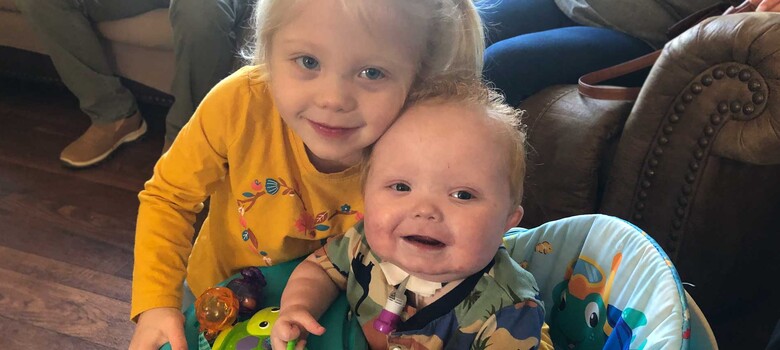The Role of the Thymus and Congenital Athymia
A functioning thymus helps immature white blood cells develop into infection- and disease-fighting T cells. Most of this activity occurs before birth and in the earliest part of childhood.
Congenital athymia occurs when a child is born without a thymus, or with a thymus that doesn’t function properly. This results in immunodeficiency, or a weak/deficient immune system that can attack the child’s organs and tissues, and put the child at high risk for deadly infections.
Thymus Implantation for Congenital Athymia
Cultured Thymus Tissue Implantation (CTTI), or RETHYMIC®
CTTI is a thymus tissue product approved for use by the FDA in 2021 to treat children with congenital athymia.
Donated thymus tissue comes from babies without athymia who require heart surgery. The thymus is often removed to safely operate on the heart underneath. Once a donor thymus is collected, it is cut into thin slices and evaluated in the laboratory to ensure it is safe to implant.
The surgical procedure involves placing the slices of thymus tissue into the child’s thigh muscle. Tiny blood vessels called capillaries grow from the muscle into the thymus tissue, providing oxygen and nutrients. If the procedure is successful, the infant develops T cells that can fight infections within 12 to 18 months following the implantation.
The Thymus Implant Process
Committee Review
Duke’s Athymia Review Committee is a multi-disciplinary team that includes a pediatric transplant and cellular therapy doctor, pediatric allergy and immunology doctor, pediatric cardiologist, pediatric critical care doctor, congenital athymia nurse practitioner, nurse coordinator, social worker, and more. Members of the committee collectively review potential patients' medical history to determine eligibility for thymus implantation.
If the committee agrees that your child could benefit from a thymus implant, the process of financial authorization begins. Because this is such a unique procedure and we treat patients from all over the United States, this can be a very lengthy process. The Duke medical and financial teams work very closely with third party payers and referring teams to speed up financial clearance as much as possible. In the interim, the Duke team maintains communication with your local doctor.
Understanding the Risks and Benefits
Following approval, you will have the opportunity to meet with the Duke athymia team via video chat to review the process and ask any questions you may have.
While Your Child Waits for a Thymus Implant
Once medical and financial approval is achieved, your child enters the final pool of patients awaiting thymus implant. This is not a “list” that is pre-assigned an order, but depends more on what donations are available and if the tissue is a right fit for your specific child.
Prior to coming to Duke, your child will require ongoing medical evaluation including blood work and imaging tests, and ongoing monitoring by your local doctor. During the wait for a thymus implant, these supportive therapies may be needed to help keep your child safe.
Medication
Before developing a healthy immune system, children with athymia need to be treated with prophylactic antibiotics and antifungal medicines to help prevent your child from getting infections.
Immunoglobulin Replacement
Normal blood plasma contains immunoglobulins, or antibodies. Children with primary immunodeficiency conditions lack these disease-fighting antibodies. Immunoglobulin replacement therapy safely infuses the body with purified antibodies to boost the immune system. Your child will likely require regular immunoglobulin replacement therapy that can be administered intravenously (directly into the bloodstream) or subcutaneously (just below the skin).
Nutrition Therapy
Your child may meet with a dietitian to ensure they receive the proper nutrients to support them through thymus implantation. This can take the form of food, formula via a feeding tube, intravenous nutrition (total parenteral nutrition), or any combination of these therapies.
Protective Environmental Isolation
Without a thymus, your child is extremely vulnerable to illness, even with preventive medications. While waiting for a thymus implant, it is essential to avoid contact with anyone who is sick and crowded public places, to protect your child from exposure to potential illness as much as possible. Good hand hygiene and masking are always recommended.
When Thymus Tissue Becomes Available
We begin to process the tissue and test for infections. When we are ready for your child to come to Duke, we communicate the exciting news as soon as possible.
While Your Child Is at Duke
Depending on your child’s condition, while in Durham, they may be cared for in an outpatient setting, with frequent clinic visits and only a short hospitalization for the thymus implantation. If your child requires inpatient care, they will be admitted to the Pediatric Stem Cell Transplant and Cellular Therapy Unit or Pediatric Intensive Care Unit depending on their unique needs. No matter where your child is treated, caution will be taken to maintain their safety as an immunocompromised child.
If admitted to the Pediatric Stem Cell Transplant and Cellular Therapy Unit, a parent or other adult caregiver is expected to stay with the child 24/7, or at least eight hours a day in the Pediatric Intensive Care Unit. Every patient’s treatment journey is different, but you can expect to remain in Durham for about six to eight weeks surrounding thymus implantation.
Immunosuppression
Depending on the specific nature of your child’s immunodeficiency and T cell function, they may or may not require immune suppression with thymus implantation. This prevents your child’s body from rejecting the implanted thymus tissue. Immune suppression if needed, is done through medications like anti-thymocyte globulin, tacrolimus, cyclosporine, or mycophenolate. Your child may receive one or more of these medications before they come to Duke.
After Thymus Implantation
Your child will remain at Duke for at least two weeks following implantation to ensure adequate recovery. Once cleared, your child will return to the care of your local immunologist for long-term management. After you return to your local doctor, the Duke athymia team maintains communication with your child’s primary medical team following implantation.
Protecting Your Child from Infection
Your child will need to continue isolation precautions following thymus implantation until their new T cells start working on their own. This can take at least one to two years, so it is very important to maintain the same practices to prevent infection as before the implantation. Your immunologist will work with the Duke team to closely track immune system recovery.


